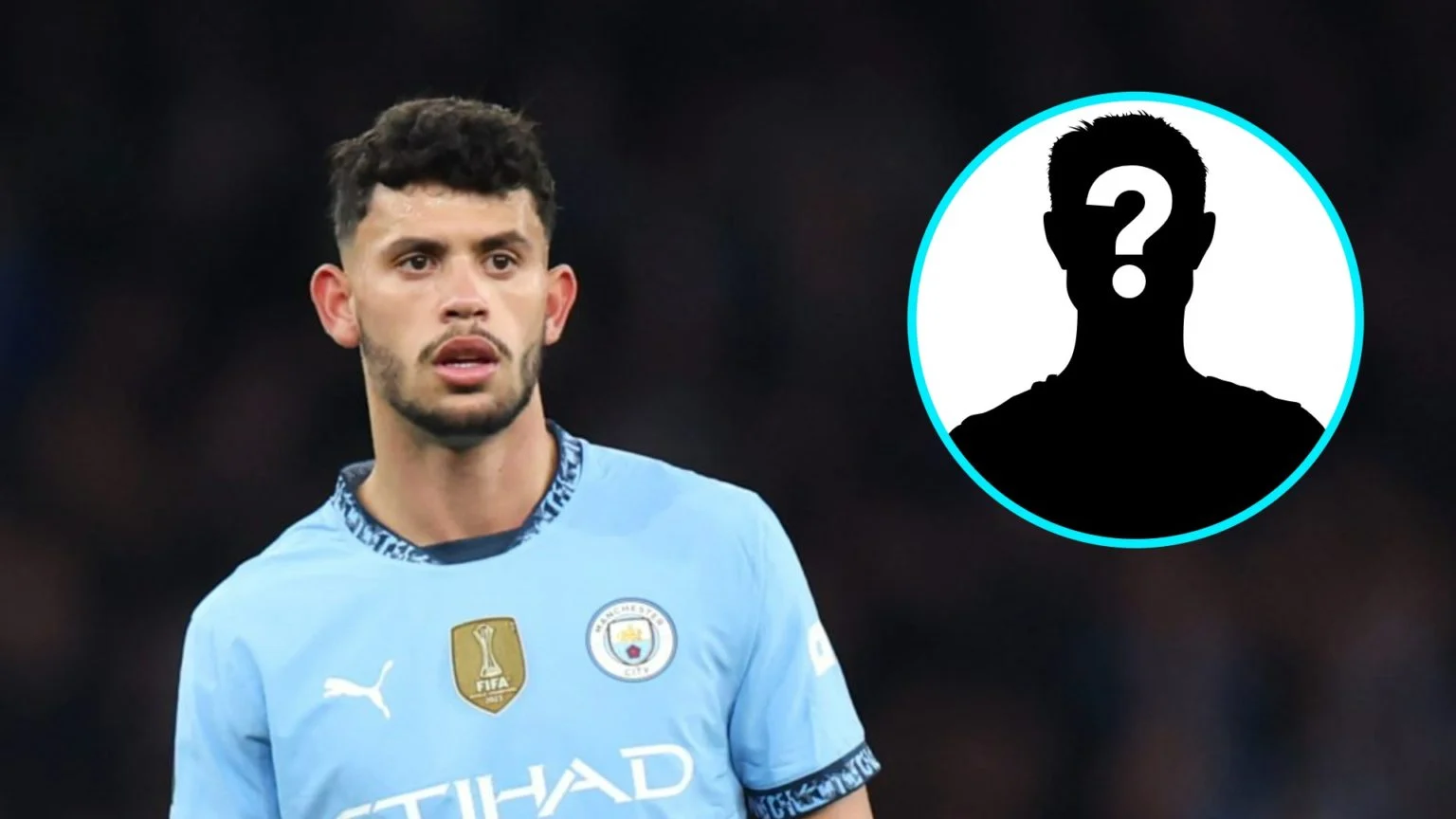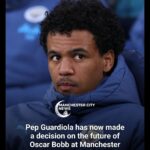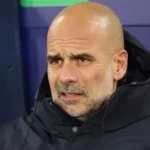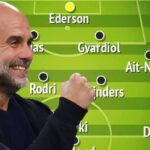Matheus Nunes names the Man City player whose talent is simply ‘off the charts’

Manchester City’s journey through the current season has been marked by both triumph and adversity, but perhaps no story encapsulates this duality better than that of Oscar Bobb. The Norwegian starlet, whose promising trajectory was dramatically interrupted by injury, is now poised to make his mark on what could be a defining campaign for the Citizens.
When Matheus Nunes arrived at the Etihad Stadium, he quickly identified the players who stood out in training sessions. Among the established stars and seasoned professionals, it was a young Norwegian who caught his attention most profoundly. “When I arrived at Man City, Oscar Bobb was one of the players that impressed me a lot in training. The talent he has is off the charts,” Nunes revealed, his words carrying the weight of someone who has witnessed exceptional ability firsthand.
This assessment from Nunes, himself a talented midfielder who understands the demands of elite football, speaks volumes about Bobb’s natural gifts. The Portuguese international’s praise isn’t merely ceremonial – it represents the genuine recognition of a peer who has observed Bobb’s technical ability, football intelligence, and adaptability during intensive training sessions at one of the world’s most demanding football clubs.
The Cruel Twist of Fate: When Promise Meets Adversity
The 2024/25 season was supposed to be Bobb’s breakthrough year. Pre-season performances had painted a picture of a player ready to transition from promising academy graduate to first-team regular. His displays during Manchester City’s preparation matches were nothing short of spectacular, culminating in a standout performance against Manchester United in the Community Shield that left fans and pundits alike convinced they were witnessing the emergence of a special talent.
The Community Shield victory seemed to set the perfect stage for Bobb’s ascension. He had demonstrated not just technical proficiency but also the mental fortitude required to perform in high-pressure situations against elite opposition. The match against United showcased his ability to influence games at the highest level, suggesting that Pep Guardiola’s faith in youth development was about to yield another remarkable dividend.
However, football’s capacity for cruel timing struck with devastating precision. Just as the new season was about to commence, Bobb suffered a fractured leg during a routine training session. The injury wasn’t the result of a reckless challenge or a moment of poor judgment – it was simply one of those unfortunate incidents that remind us of football’s inherent unpredictability and the fragility of athletic careers.
The timing couldn’t have been worse. Bobb had worked tirelessly through pre-season, earned his place in Guardiola’s plans, and was mentally prepared for the challenges ahead. Instead of gracing Premier League pitches and Champions League venues, he found himself facing months of rehabilitation, watching from the sidelines as his teammates pursued glory without him.
The Long Road to Recovery: Documenting a Journey of Resilience
Manchester City’s decision to document Bobb’s rehabilitation journey provides insight into both the player’s character and the club’s commitment to its talents. The recovery process from a fractured leg involves not just physical healing but mental fortitude, as players must maintain motivation and focus during extended periods away from competitive action.
Throughout this challenging period, Bobb’s teammates rallied around him, offering support and encouragement. The presence of players like Matheus Nunes in the recovery documentation video demonstrates the strong bonds within the City squad and their collective investment in each other’s success. These relationships, forged through shared experiences and mutual respect, often prove crucial during the most challenging periods of a player’s career.
The rehabilitation process for a fractured leg is methodical and cannot be rushed. It involves multiple phases, from initial healing and immobilization to gradual weight-bearing, strength rebuilding, and eventually return to football-specific movements. For a player of Bobb’s age and ambition, each day away from the pitch represents not just physical healing but also mental preparation for an eventual return to elite competition.
Competition and Context: The Evolving Landscape at Manchester City
Bobb’s return to fitness coincides with significant changes in Manchester City’s squad composition and tactical approach. The club’s summer transfer activity has been particularly aggressive, with the arrivals of Rayan Cherki, Tijjani Reijnders, Rayan Ait-Nouri, and Marcus Bettinelli adding depth and quality to various positions. This increased competition for places means that Bobb’s pathway back into the first team may be more challenging than it would have been a year ago.
The addition of these high-profile signings reflects Manchester City’s determination to bounce back from what they perceived as a disappointing 2024/25 campaign. Pep Guardiola’s stated intention to add four to five new faces to his squad demonstrates the club’s unwillingness to accept standards below their usual excellence. This context means that Bobb must not only prove his fitness but also demonstrate that his abilities merit selection ahead of expensive new acquisitions.
However, this increased competition could ultimately benefit Bobb’s development. Training alongside players of the caliber of Cherki and Reijnders will push him to elevate his own standards, while the presence of established stars provides learning opportunities that money cannot buy. The competitive environment at elite clubs often brings out the best in young players, particularly those with the mental strength to thrive under pressure.
The Club World Cup Campaign: A Platform for Redemption
Manchester City’s participation in the Club World Cup has provided an ideal platform for players like Bobb to demonstrate their readiness for regular first-team action. The tournament’s format, with multiple group stage matches followed by knockout rounds, offers opportunities for squad rotation and player development that might not be available in more compressed domestic schedules.
The 6-0 victory over Al Ain served as a perfect example of how these tournaments can benefit emerging talents. Bobb’s goal in that match wasn’t just a statistical contribution – it represented a symbolic moment of return, a declaration that his injury setback was firmly in the past. The goal also demonstrated his ability to perform in competitive matches, translating training ground excellence into match-day impact.
The upcoming fixture against Juventus presents an even greater test. The Italian giants bring a level of tactical sophistication and defensive organization that will challenge every aspect of Bobb’s game. Success against such opposition would provide compelling evidence of his readiness for the highest level of European competition.
Comparative Analysis: Bobb vs. Echeverri
The comparison between Oscar Bobb and Claudio Echeverri provides fascinating insight into Manchester City’s approach to youth development. Both players represent significant investments in the club’s future, but their paths to first-team integration differ markedly.
Nedum Onuoha’s assessment that Bobb may have a greater immediate impact than Echeverri this season reflects several important factors. Bobb’s age advantage, combined with his previous experience in City’s system, gives him familiarity with Guardiola’s tactical demands and the intensity of English football. His pre-injury performances demonstrated an understanding of the Premier League’s physical and mental demands that younger players often need time to develop.
Echeverri’s recent injury, resulting in his appearance on crutches, adds another layer of complexity to this comparison. The hope within the club is that he won’t suffer the same extended setback that Bobb experienced, but any significant injury at such a crucial stage of development can have lasting impacts on a young player’s trajectory.
The decision to keep Echeverri at the club rather than sending him on loan suggests that Guardiola sees immediate potential for contribution. However, Bobb’s combination of experience, recovery motivation, and proven ability at senior level may give him the edge in the competition for playing time.
Transfer Market Dynamics: City’s Continued Ambition
While Bobb’s story represents internal development and recovery, Manchester City’s transfer activities demonstrate their continued ambition in the external market. The reported monitoring of Benjamin Sesko, despite Arsenal’s apparent progress in negotiations, illustrates City’s approach to squad building – always exploring opportunities to strengthen, even in positions where they appear well-stocked.
The £64 million valuation of Sesko reflects the premium placed on young, proven goalscorers in today’s market. While Manchester City’s possession of Erling Haaland might seem to make striker recruitment unnecessary, the club’s interest suggests either a desire for competition and depth or perhaps consideration of tactical flexibility that a different type of forward might provide.
This transfer speculation also highlights Manchester City’s financial strength and strategic thinking. By monitoring targets pursued by rival clubs, they maintain leverage in future negotiations while potentially disrupting competitors’ plans. The psychological impact of City’s interest in a player can often influence both the selling club’s valuation and the player’s own decision-making process.
Tactical Considerations: Bobb’s Role in Guardiola’s System
Oscar Bobb’s return to fitness comes at a time when Pep Guardiola continues to evolve Manchester City’s tactical approach. The Norwegian’s versatility – his ability to operate in multiple attacking positions – makes him particularly valuable in Guardiola’s system, which often requires players to interchange positions and adapt to different tactical scenarios within individual matches.
Bobb’s technical ability, praised so highly by Matheus Nunes, aligns perfectly with Guardiola’s football philosophy. The Spanish manager’s emphasis on precise passing, intelligent movement, and positional awareness requires players who can execute complex tactical instructions while maintaining individual creativity. Bobb’s pre-injury performances suggested he possesses these qualities in abundance.
The playmaker role, in particular, seems ideally suited to Bobb’s skillset. In modern football, the traditional number 10 position has evolved to require greater tactical flexibility and defensive responsibility. Players in this role must be comfortable receiving the ball in tight spaces, have the vision to create opportunities for teammates, and possess the work rate to contribute defensively when required.
The Psychological Factor: Overcoming Adversity
The mental aspect of Bobb’s return cannot be understated. Serious injuries, particularly those that occur at crucial career junctures, can have lasting psychological impacts on players. The fear of re-injury, the pressure to immediately return to previous performance levels, and the awareness of lost time all contribute to the mental challenges facing returning players.
However, Bobb’s apparent successful navigation of his rehabilitation period, combined with his immediate impact upon return, suggests strong mental resilience. This psychological strength often proves more valuable than physical attributes in determining long-term success at elite levels. Players who overcome significant setbacks frequently develop a mental toughness that serves them throughout their careers.
The support system around Bobb – from Manchester City’s medical staff to his teammates like Matheus Nunes – has clearly played a crucial role in his recovery. The club’s investment in sports psychology and holistic player development reflects their understanding that modern football success requires attention to all aspects of player wellbeing.
Future Projections: The Season Ahead
As Manchester City progresses through the Club World Cup and prepares for the resumption of domestic competition, Oscar Bobb’s role will likely continue to evolve. The combination of his proven ability, renewed motivation following injury recovery, and the tactical flexibility he provides makes him a valuable asset for Guardiola’s squad rotation needs.
The packed schedule of modern elite football actually works in Bobb’s favor. With Champions League, Premier League, FA Cup, and League Cup commitments, Manchester City will need to utilize their entire squad throughout the season. Players who can perform reliably when called upon become invaluable, and Bobb’s early season performances suggest he has earned Guardiola’s trust.
The comparison with other young players in similar situations across European football provides additional context for Bobb’s situation. History shows that players who successfully return from significant injuries often develop a deeper appreciation for their careers and a stronger work ethic. These qualities, combined with Bobb’s natural talent, position him well for sustained success.
Conclusion: A Story of Resilience and Renewed Promise
Oscar Bobb’s journey from promising young talent to injury victim to returning contributor encapsulates many of the challenges and opportunities present in modern football. His story resonates not just because of his individual talent – praised so emphatically by teammates like Matheus Nunes – but because it represents the resilience and determination required to succeed at the highest level.
The Norwegian’s return comes at a time when Manchester City are rebuilding and reassessing after a challenging period. His contribution to the Club World Cup campaign, combined with the tactical flexibility he provides, positions him as potentially crucial to the club’s renewed ambitions. The talent that Nunes described as “off the charts” now has the platform to demonstrate its full potential.
As the season progresses, Bobb’s story will continue to unfold. Whether he can maintain his early momentum, establish himself as a regular contributor, and help Manchester City achieve their collective goals remains to be seen. However, his journey back from serious injury, the faith shown in him by teammates and coaching staff, and his early performances upon return all suggest that Oscar Bobb’s best days lie ahead.
The intersection of individual talent, collective support, and organizational excellence that characterizes Bobb’s situation exemplifies Manchester City’s approach to squad development. In a football landscape increasingly dominated by astronomical transfer fees and short-term thinking, the successful integration of academy products like Bobb represents both sporting and financial wisdom.
For Manchester City fans, Oscar Bobb’s return offers hope for the future while providing immediate excitement in the present. His story reminds us that football’s greatest rewards often come to those who persevere through adversity, supported by teammates who recognize exceptional talent when they see it.















